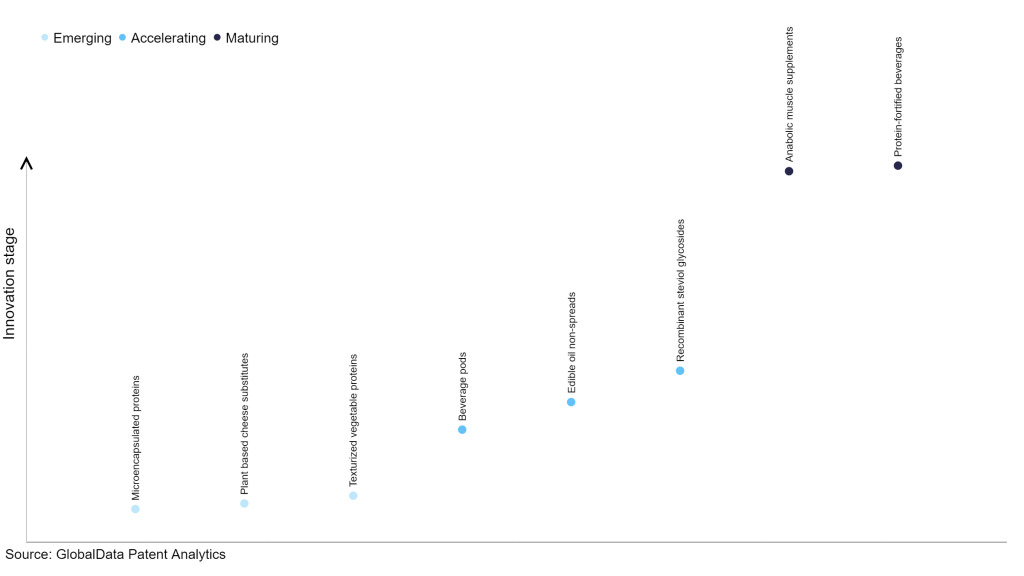The consumer industry continues to be a hotbed of patent innovation. Activity is driven by veganism, environmental awareness, and sustainability, and growing importance of technologies such as plant-based protein, 3D food printing, and personalized nutrition. In the last three years alone, there have been over 52,000 patents filed and granted in the consumer industry, according to GlobalData’s report on Innovation in consumer: texturized vegetable proteins. Buy the report here.
However, not all innovations are equal and nor do they follow a constant upward trend. Instead, their evolution takes the form of an S-shaped curve that reflects their typical lifecycle from early emergence to accelerating adoption, before finally stabilizing and reaching maturity.
Identifying where a particular innovation is on this journey, especially those that are in the emerging and accelerating stages, is essential for understanding their current level of adoption and the likely future trajectory and impact they will have.
30+ innovations will shape the consumer industry
According to GlobalData’s Technology Foresights, which plots the S-curve for the consumer industry using innovation intensity models built on over 12,000 patents, there are 30+ innovation areas that will shape the future of the industry.
Within the emerging innovation stage, microencapsulated proteins, plant-based cheese substitutes, and texturized vegetable proteins are disruptive technologies that are in the early stages of application and should be tracked closely. Beverage pods, edible oil non-spreads and recombinant steviol glycosides are some of the accelerating innovation areas, where adoption has been steadily increasing. Among maturing innovation areas are anabolic muscle supplements and protein-fortified beverages, which are now well established in the industry.
Innovation S-curve for the consumer industry

Texturized vegetable proteins is a key innovation area in consumer
Texturized vegetable proteins are meat substitutes prepared from plant sources. Soybeans are the most consumed materials for texturized vegetable protein. However, wheat, peanut, cottonseed, and corn can also be used for this purpose. These proteins are highly processed, and are prepared by isolating protein from other components in the whole source, such as whole soybeans. Growing veganism for ethical and health reasons has been a key factor behind the rise in demand for texturized vegetable proteins.
GlobalData’s analysis also uncovers the companies at the forefront of each innovation area and assesses the potential reach and impact of their patenting activity across different applications and geographies. According to GlobalData, there are 110+ companies, spanning technology vendors, established consumer companies, and up-and-coming start-ups engaged in the development and application of texturized vegetable proteins.
Key players in texturized vegetable proteins – a disruptive innovation in the consumer industry
‘Application diversity’ measures the number of applications identified for each patent. It broadly splits companies into either ‘niche’ or ‘diversified’ innovators.
‘Geographic reach’ refers to the number of countries each patent is registered in. It reflects the breadth of geographic application intended, ranging from ‘global’ to ‘local’.
Patent volumes related to texturized vegetable proteins
Source: GlobalData Patent Analytics
In terms of patents filed, Nestle is the leading company in the texturized vegetable proteins space, followed by Roquette Freres and Gold & Green Foods. In November 2022, Nestle launched a plant-based protein that serves as an egg alternative. Prepared from soy-based alternative, the product is claimed to contain the same amount of protein as eggs, albeit with lower cholesterol and saturated fats. According to the company, the product contains ironand can be used in a variety of dishes such as omeletes, scrambled eggs, and baking.
In terms of application diversity, British American Tobacco is the leading company, while Houdek and Aleph Farms stood in the second and third positions, respectively.
By means of geographic reach, Anabio Technologies leads the pack, followed by Air Protein and FMC.
To further understand the key themes and technologies disrupting the consumer industry, access GlobalData’s latest thematic research report on Consumer.
Data Insights
From

The gold standard of business intelligence.
Blending expert knowledge with cutting-edge technology, GlobalData’s unrivalled proprietary data will enable you to decode what’s happening in your market. You can make better informed decisions and gain a future-proof advantage over your competitors.



